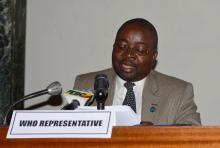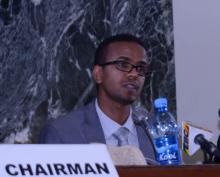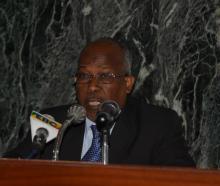IGAD regional cancer center resource mobilization conference held in Addis Ababa, Ethiopia
The Inter-governmental Authority on Development (IGAD) has held a resource mobilization conference for the establishment of a regional cancer center of excellence in Addis Ababa to strengthen and enhance cancer services in its member states has been held at the UN-ECA Africa hall in Ethiopia on 20-21 April, 2016.
According to WHO, Cancer is among the leading causes of morbidity and mortality worldwide, with approximately 14 million new cases and 8.2 million cancer related deaths in 2012. And more than 60% of world’s total new annual cases occur in Africa, Asia and Central and South America. These regions account for 70% of the world’s cancer deaths.
Dr. Amir Aman, Ethiopian State Minister of Health said on the occasion that tackling cancer in the region will require a comprehensive collaborative approach with cancer clinicians, scientists, patients, advocates, policy makers and community leaders.
Dr. Amir says lack of proper data and evidence, limited pathology services in many African countries, lack of trained personnel, lack of access to treatment and huge resources drained out for cancer treatment in developed countries are the major challenges in the sub region for cancer care.
“Establishing a cancer center of excellence in the region would play a significant role in improving access to cancer care, and as well creating a huge resource base for the region in producing adequate number of human resources and expertise on cancer,” Dr. Amin said.
Representing WHO regional Director for Africa, Dr. Matshidiso Rebecca Moeti; Dr. Mutale Mumba said that in 2008, in Africa, about 715,000 new cancer cases and 542,000 cancer deaths occurred and in the next 20 years these numbers are expected to double because of the aging and growth of the population.
Dr. Mutale said that the increase in the number of cases of cancer is recognized as a worrying public health problem in Africa and yet many lives can be saved if emphasis is placed on strengthen public awareness on its risk factors.
Dr. Mutale also expressed WHO’s commitment to work with the IGAD in providing all needed technical support in the designing of the IGAD regional cancer center of excellence; incorporating the center into member states national cancer control plans, supporting HR and the functioning of the center; and facilitating coordination of the cancer support services to address the increase burden of cancer.
Representing IGAD executive secretariat, Elsadeg Abdallah, director of economic cooperation and social development division said that the regional cancer center will address the challenges of cancer services in the IGAD region by providing effective prevention, diagnosis, treatment, research and holistic care and support.
He said the conference will be an important event to build confidence and promote strong partnership as well as renewed commitment by member states and IGAD development partners.
The conference is also expected to provide a platform for representatives of IGAD member states, the African Union Commission, the New Partnership for Africa's Development (NEPAD), UN Agencies, development partners, the private sector, national and regional institutions and other stakeholders to discuss the need to establish the RCCE; to address the challenges of the people of the region; to benefit from effective prevention, diagnosis, treatment and provision of holistic care & support for Cancer.






